So we have a data Leak from Google that let’s us know exactly how the Google algorithm works. Now you know exactly what to do to be #1.
Before we go any further you must know that this was brought to the publics attention by Rand Fishkin. He makes it clear that he received an email from someone claiming that the leaked documents were confirmed as authentic by ex-Google employees.
So, keep an open mind here. This could well be a hoax and the leaked documents may not come from inside Google. This might not have come from Google and this might not affect the way Google ranks websites in any way.
You should also keep in mind that just because the mighty Google collects certain data that it doesn’t mean they use it to determine where a website ranks in the SERPs.
Let’s take a look at some of the things we can see from the leaked data that might change the way we do SEO.
DATA COLLECTED FROM CHROME BROWSER USERS
Google has always been insistent through their X-posts that they do not use Chrome behaviour to determine where a website ranks.
So what does the leak say? Does Google really use Chrome data to influence the rankings?
In fact, the leak states that Google does use Chrome data, more specifically how a user interacts with a website.
The leaked data actually mentions it 50 times throughout the document. It means a users clicks and interactions on a website does influence that sites rankings.
The way a user behaves on the website will in fact change it’s placement in the SERPs.
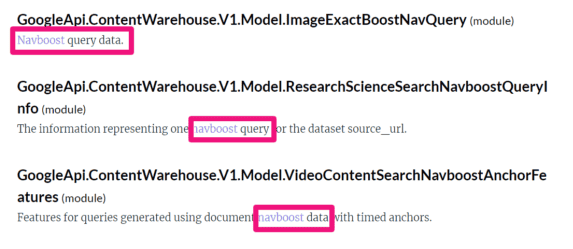
This shows that people using the Chrome browser are being tracked, and their behaviour does influence website rankings.
This means the following things that you do on a website will affect it’s Google keyword placement:
- Click Data – what you click on and if you click back.
- Engagement – how long a user is on a page and how many page views are made.
- Topic – if the user goes to related pages/posts on a site.
- Images – if a user click or interact with images.
This isn’t just through the desktop, it is tracking mobile users too.
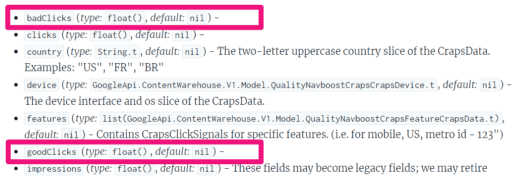
With all this in mind, are you going to change your browser and stop using Chrome?
Everything you do is being tracked according to the leaked doc, how you behave on a website does in fact feed data into the algorithm to change rankings.
GOOGLE USES IT’s OWN SITE AUTHORITY METRIC SCORE
Google has always stated that they do not use a site authority metric to influence rankings.
We all know about the PageRank score, that they have admitted to using.
The leaked document states that the algorithm is influenced by a metric score called siteAuthority.

The leak reveals that Google rankings are influenced by a websites siteAuthority score.
This might even play a massive part in the Google algorithm and where it places a website in the results pages for a focus search term.
If we believe the leak to be true, then we now know that Google is collecting this data and giving each site an authority score.
So not only does Google score a website on the domain as a whole, but they also rate each page individually too.
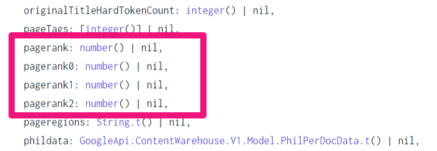
Also, be aware that MOZ metrics DA, PA and AHREFs metrics DR, UR are a lot different. These metrics are not user behaviour based at all, they are 100% influenced by backlinks.
GOOGLE DOES HAVE A SANDBOX FOR SPAM
Google has never let on that the sandbox does exist. But we know it does, through years of testing we know that new sites sometimes do not index or rank at all until they have proved their worth.
Many people that work in SEO think that this sandbox will hold a site for anywhere between 3 and 6 months.
The leak does mention a sandbox and the word spam under something named hostAge.

It reveals that the websites age will stop it showing in the SERPs due to the SandBox. If we believe the leak to be true we know that this is now part of Google ranking algorithm.
This makes use believe that a new website will struggle to rank for certain keywords until it has showed some authority in terms of content and user interaction. This data will take time to build up, hence the 3 to 6 month SandBox effect.
HUMAN SITE REVIEWS DO EXIST
So we know that Google hires people to asses the SERPs and websites. Here are the search quality guidelines that they follow.
Google have always claimed that the feedback does not directly influence rankings. Well the leak makes us believe otherwise.
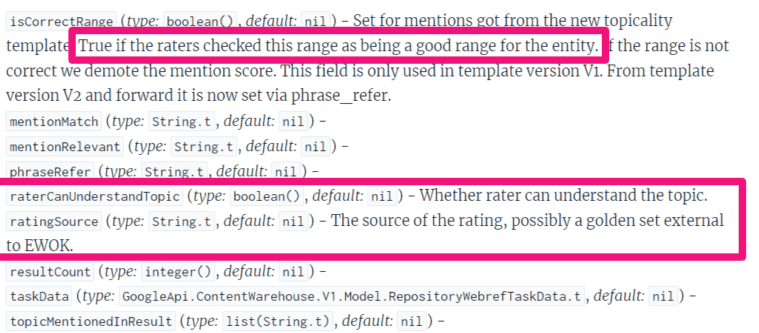
It suggests that some of the metrics collected by these human quality raters are stored and used to influence a websites Google rankings.
Let’s take a look at how these quality raters are influencing the Google rankings:
- Golden – is a term used that Google quality raters give to web pages.
- isReadable – is the term for the quality of the content as assessed by a Google hired human rater.
This means that a human quality rater hired by Google will affect the sites rankings. Their webpage score and content quality score will change where the site lands in the SERPs for it’s target search term.
If we believe the leak to be true, then someone hired by Google to asses your website for quality will affect your rankings.
FRESH CONTENT ON A WEBSITE DOES MATTER
Just from common sense we know that Google loves up to date content, some subjects it is more important than others.
In the past some Google employees have revealed that fresh content does not matter.
The leak leads us to believe otherwise, and our common sense does too.
Factors that can influence rankings based on freshness:
- The date the content was published (shown in the byline).
- Dates shown in the URL.
- Dates actually put into the content itself.
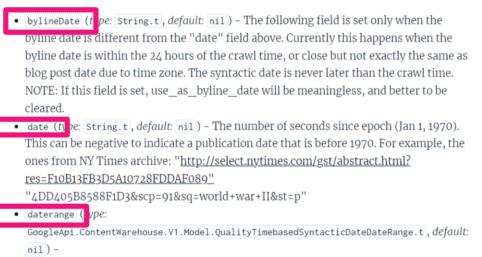
Take a look at the following attributes that suggests the content freshness influences rankings:
- adjustmentInfo, date – indicates when large sections of the content have been updated.
- timeAnnotations – tracking how up to date the content is.
This shows that Google really does track when your content is being changed and updated.
We know that in certain niches this is important, and just from common sense we know that this is a ranking factor.
For example, if you have a website in the news niche then it is super important to keep that content flowing and fresh:
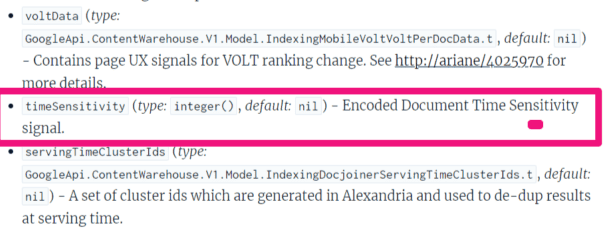
The “time sensitivity” attribute will influence how long a piece of content will show in the SERPs.
The “NewspaperSpecific” attribute will allow the latest news articles to be boosted up the SERPs.
This isn’t nothing new, we just need to keep our content up to date. Remember to edit out of date stuff and rankings will get a boost.
AI CONTENT IS LESS LIKELY TO RANK HIGHER THAN HAND WRITTEN HUMAN CONTENT
This is a tough one. I mean you can use AI to write your content and then use tools to SPIN it and correct the grammar so it appears hand written by a human.
How can you tell the content has been generated by AI?
I know from my own testing that AI generated content will index and it will rank #1 on Google, I have done it.
The leaked document uses this golden attribute to make us believe that human hand written content takes president over AI content.

This means human hand written content is more likely to get higher keyword rankings over AI generated content.
This is something I do not agree with. AI generated content can be edited to read better than hand written content.
I have tested AI generated content and it does rank. My personal advise is: DO NOT GET LAZY. This means you should edit the content and use other tools to spin it and correct the grammar. I highly recommend using quillbot.com for this.
GOOGLE HAS A WEBSITE WHITELIST
Google have often stated that they can’t manually influence rankings due to the vast size of the net.
However, the leaked document states that there is a WhiteList for certain sites and content subject matter.
Just by being a Google user you will notice that sites get preferential treatment in certain niche areas. For example, if you are searching for anything medical related you will always notice WebMD somewhere in the SERPs near the top.
To prove it, take a look at this:

The “isElectionAuthority” attribute favors sites that have the election authority signal.
The leak shows that Google will whitelist any site that it wants to, and as a result will rank easy for keywords within its specific niche.
We already knew this anyway, this just confirms it.
BACKLINKS ARE IMPORTANT AND ALWAYS WILL BE
We didn’t really need this to be confirmed. We all know that backlinks will influence keyword rankings and always will do.
The leaked document mentions attributes related to backlinks 136 times. Backlinks are still the #1 ranking signal for Google.

The “linkWeight” attribute will influence rankings based on the strength of the link. Is it niche related, is it from an aged domain, is it contextual etc.
The “penguinPenalty” attribute means that the anchor text used within the backlink will influence keyword rankings. A Penguin penalty will mean you have over used target keywords as anchor text.
Here are some more attributes related to backlinks:
- linkData – this means the backlink is surrounded by niche related quality content/text.
- NumBackwardLinksInWoS – how many backlinks are pointing to a page/website.
We all know from test after test that backlinks play an important role in keyword rankings. Be sure to mix up your anchor text and focus on quality over quantity on tier 1.
If your keyword rankings drop after you have got more backlinks the question you should ask yourself is: have I used too many exact keyword match anchor texts?
It’s easy to resolve this issue, so it is nothing to worry about in the long term.
HAVE A DIVERSE BACKLINK PROFILE FOR HIGHER RANKINGS
John Mueller stated on X (now deleted) that word count, anchor text ratio, the number of backlinks a site has does not influence keyword rankings.
We all know that this is complete rubbish. SEO after SEO expert has proven this incorrect.
The leak indicates that a diverse backlink profile will help your website rankings.
We know it’s not about quantity on tier 1, it’s important to get different kinds of links that have so called quality. Quality means it’s from a niche related aged domain (for me anyway) surrounded by good keyword rich content.
As you already know, here at Rankers Paradise we test backlinks and their effects daily. We even give you the opportunity to buy backlinks that we have proven to get good keyword ranking results.
A diverse backlink profile indicates to Google bot that your website is a trusted source for your target search term.
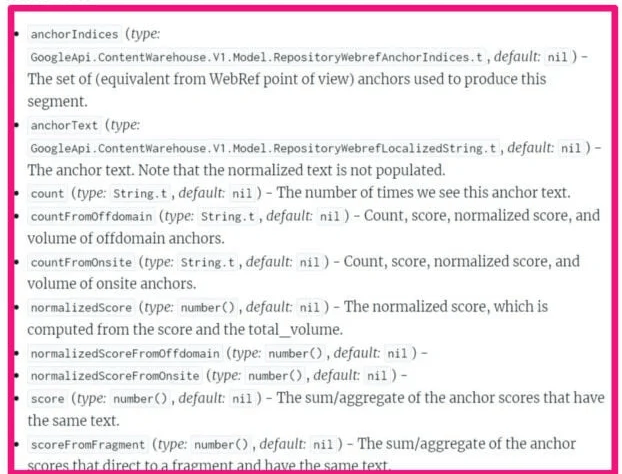
According to the leaked file from Google, that is what a very good backlink profile should look like. That is what will get you #1 on Google.
There are a whopping 44 attributes focused around anchor text and backlinks.
- numIncomingAnchors – the amount of backlinks and anchor text pointing to the site.
- AnchorSpamInfo – this rates the text used in the anchors to identify if a webmaster is trying to game the results, using the sames anchors over and over indicate this.
A website will lose keyword rankings if it is noted by Google bot as trying to change the rankings by building or buying backlinks. They key to not trigger this is to check what anchor text the #1 ranking site is using, use what works. It’s that simple.
BAD BACKLINKS WILL HURT YOUR RANKINGS
It is a good idea to find your bad backlinks and disavow them.
The leak reveals that bad backlinks will affect your keyword rankings.
The attributes “phraseAnchorSpamPenalty” and “spamrank” indicate a penalty for a website using spam links and spam anchor text.
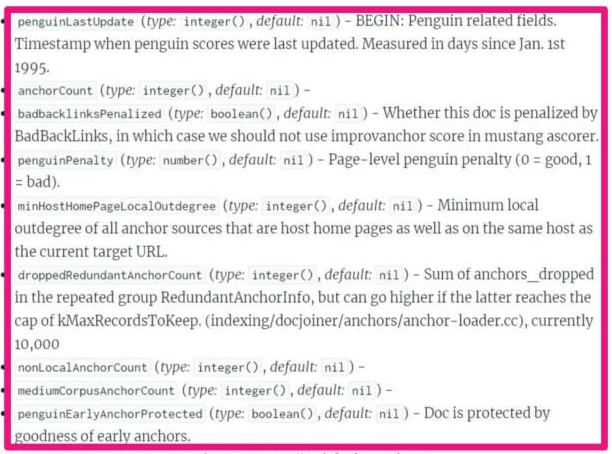
The leak reveals that Google not only count external anchors, but also internal anchors. Do not use too many exact keyword match anchors on internal links also.
Pay attention to your anchor text, this will be a big reason why your website is not #1 for your target keyword.
Get more links in place to get a better anchor text profile. Take a look at the anchor text profile of the top rankings sites. Using too many exact keyword match anchors will not help you rank for that keyword.
BACKLINKS FROM NEW POSTS/PAGES ARE JUST AS GOOD [IF NOT BETTER] THAN FROM OLD POSTS/PAGES
This attribute was a big surprise to me. It suggests that backlinks from newer posts/pages have more ranking powers than links from aged ones.
The attribute “Freshdocs” reveals that links from fresh content have more impact than links inserted into old/aged content.
You can also take note of the “creationDate” attribute. This refers to the time that the backlink first came into place.

Take from this what you want. But new fresh links within fresh content do have an impact on rankings.
This means aged backlinks will lose their impact on your keyword rankings over time.
Which re instates what we here at Rankers Paradise have always adhered to: keep the links flowing. This is our mantra as part of our monthly SEO service, we work on backlinks daily.
LINKS OUT TO AUTHORITY SITES WITHIN YOUR CONTENT DO MATTER
The leaked document suggests that there is a rating system in place for internal and external links.
The attributes like “outlinkScore” and “outlinkDomainRelationship” rate through relevance for your external links.
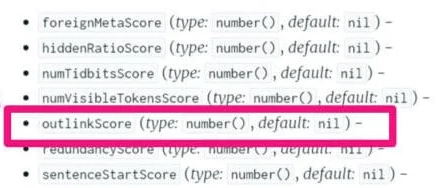
Let’s take a look through some of these attributes for outbound links:
- outlinkScore – a ratings value for an external link to another resource on the web.
- outlinkDomainRelationship – looks at the niche of the links and it’s relationship with yours.
- indexingConverter LinkRelOutlinks – looks at the relevance of the content to the outbound links content.
- webrefOutlinkInfos – linking to high authority sites in the same niche as yours can signal better page content quality.
This means that if you write a new piece of content and you link out to high trust resources within your niche your rankings will be better.
Going forward you should always link out to high authority sites related to your overall domain and the page content matter.
Google have said that this is not a ranking signal, the leaked document tells us a different story.
Anyway, you will always link to a trusted resource anyway? Wouldn’t you?
So I don’t think this will change anyone’s current SEO strategy too much.
GOOGLE DOES HAVE A RATING VALUE FOR BACKLINKS
The leak supports the fact that Google does have a score for rating backlinks. Google have denied this in the past telling some people to ignore Toxic Link Scores and other metrics to the same ilk.
The leak reveals that Google has an in-depth system for rating backlinks.
When it comes to poor SPAM backlinks it can get quite complicated.
We know that a backlink can hurt your keyword rankings when:
- spamScore – the rating for how poor a backlink is high.
- spamrank – A measurement from 0 and 65535. If the number is high this indicates more SPAM links.

There is an attribute called “badbacklinksPenalized” so we know rankings are affected because of poor links and poor anchor text use.
The “spamPenalty” attribute reveals that a backlink will be highlighted as SPAM and have a negative impact on keyword rankings.
There is a SPAM scoring system for backlinks, so always keep this in mind when you are working through your SEO strategy.
Quality links on tier 1 should always be your main focus, ensure the links come from different platforms and IPs and you will be good to rank high.
THE AUTHOR OF THE CONTENT WILL INFLUENCE RANKINGS
We know from common sense that a certified doctor writing for a high authority site in the medical niche like WebMD will always rank high.
Google claims that it does not use an authorship score to rank content, the leaked document tells us a different story.
In recent years Google have change their statement on this and revealed that the author stated in the Schema is important.
The leak reveals that Google stores author data and uses it as a ranking signal.
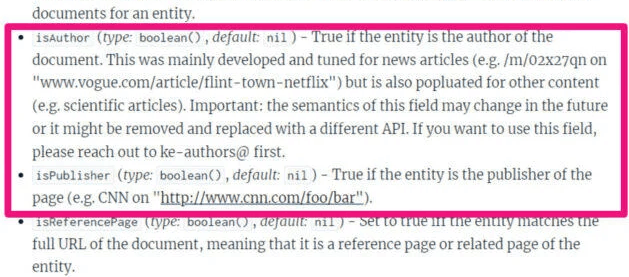
The attribute “OceanVolumeImprint” reveals that the author of the content will impact the keyword rankings.
We know that Google does favor sites and authors in certain niches. This is proven in the leak and we can use this to our advantage.
Go into a niche/keyword battle that you know you can win. Check the competition before you start, make sure these dominant authors are not at the top of the SERPs for your target search term.
This gives you the chance to take the top spot.
SUBDOMAINS ARE TREATED DIFFERENT
It is know that Google states that domains and subdomains are treated the same, we all know different. We just need to look at the SERPs to know that this is false.
The leak also tells us that subdomains are treated different too.
Let’s take a look:
- Separate Evaluation: subdomains have less authority for ranking than the main domain.
- Ranking Impact: subdomain rankings are not influenced by the main domain. This means web 2.0 backlinks are a separate entity in terms of ranking.
We should not expect the main domain to help rank the sub-domain. It needs to be treated as a different site if we believe this leak.
So we can be sure that the main domain that hosts the web 2.0 sites will not have an impact on the sub domain web 2 keyword rankings.
FINAL THOUGHTS
Go ahead and follow the link at the start of this post to take a look through the entire leaked document.
It’s guaranteed that you are going to find it very interesting.
It’s pretty much just confirmed what we all knew anyway, with a few added surprises along the way.
We will keep testing and keep you informed if we think there is anything important you should know.
Let us know your thoughts on this in the comments.
Remember to keep those backlinks flowing and you will always have those rankings in place.
If you do have any problems with your rankings it is most likely because of one of the ranking factors featured in this post. Take a look through and make the alterations and get your keywords where you want them to be.
As always, if you need any help we are on live chat right now, we are happy to talk to all of you no matter what your problem might be.